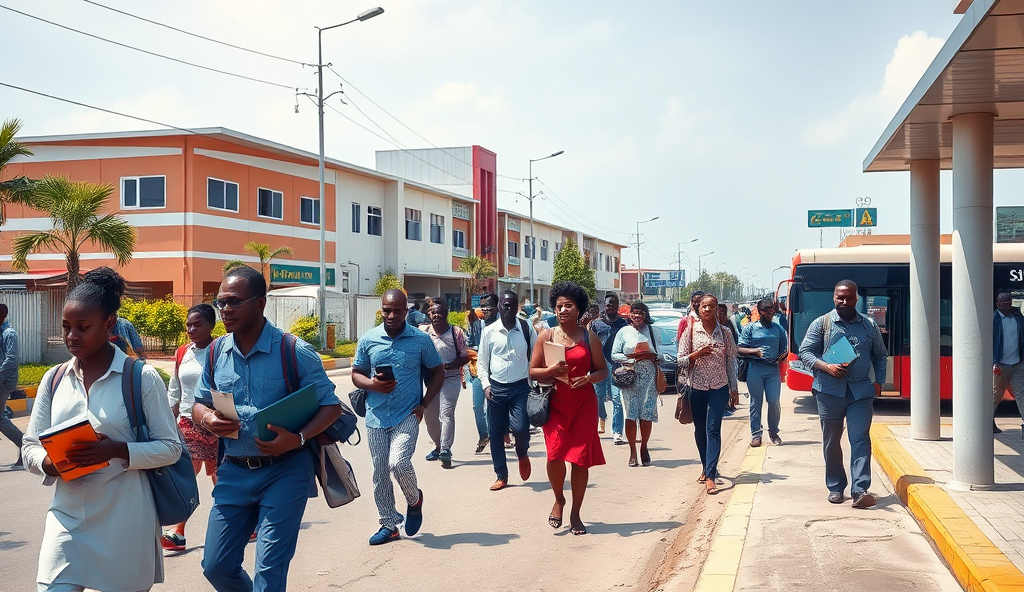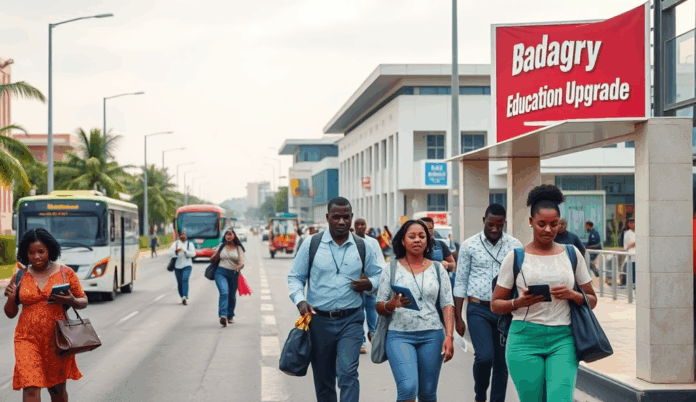Introduction to the Need for Better Educational Facilities in Badagry
Badagry’s growing student population faces persistent challenges due to inadequate learning infrastructure, with many schools lacking basic amenities like functional libraries and science laboratories. A 2022 Lagos State education report revealed that only 30% of public secondary schools in Badagry meet the minimum standard for classroom capacity, forcing students to learn in overcrowded spaces.
The absence of modern teaching tools and frequent power outages further hinder effective learning, putting Badagry students at a disadvantage compared to peers in better-resourced regions. For instance, while urban schools in Lagos Mainland benefit from digital learning initiatives, most Badagry institutions still rely on outdated chalkboard methods.
These systemic gaps highlight the urgent need for education upgrades in Badagry, from improved facilities to teacher training programs. Understanding the current state of education in Badagry is the first step toward advocating for meaningful change.
Key Statistics

Understanding the Current State of Education in Badagry
A 2022 Lagos State education report revealed that only 30% of public secondary schools in Badagry meet the minimum standard for classroom capacity forcing students to learn in overcrowded spaces.
Badagry’s education system reflects stark disparities, with only 12% of public schools having access to computer labs compared to 65% in Lagos Mainland, according to a 2023 UNICEF report. This digital divide exacerbates inequality, leaving Badagry students unprepared for tech-driven job markets while urban counterparts gain competitive skills.
Teacher shortages further compound these challenges, with a student-teacher ratio of 45:1 in Badagry versus the recommended 20:1 by Nigeria’s Universal Basic Education Commission. Many educators lack training in modern pedagogies, perpetuating reliance on rote learning methods that fail to foster critical thinking.
These systemic issues underscore why education upgrades in Badagry must address both infrastructure and human capital gaps. The next section will dissect specific obstacles hindering progress, from inadequate funding to policy implementation delays.
Identifying Key Challenges Facing Badagry Schools
Badagry’s education system reflects stark disparities with only 12% of public schools having access to computer labs compared to 65% in Lagos Mainland according to a 2023 UNICEF report.
Chronic underfunding remains the root cause of Badagry’s education crisis, with only 8% of Lagos State’s 2023 education budget allocated to the district despite housing 15% of its student population. This financial neglect manifests in dilapidated classrooms where 60% of structures lack proper roofing according to a 2022 SUBEB infrastructure audit.
Policy implementation gaps further stall progress, as evidenced by the unfinished smart classroom project abandoned since 2019 despite federal approvals. Local administrators cite bureaucratic bottlenecks and misaligned priorities between state and local governments as recurring obstacles to education development in Badagry.
Geographic isolation compounds these issues, with 40% of rural schools inaccessible during rainy seasons according to community surveys. These interconnected challenges demand coordinated solutions, setting the stage for student-led advocacy to bridge the gap between policy promises and tangible improvements.
The Role of Students in Advocating for Change
Chronic underfunding remains the root cause of Badagry’s education crisis with only 8% of Lagos State’s 2023 education budget allocated to the district despite housing 15% of its student population.
Students in Badagry possess unique power to drive education reform, as evidenced by the 2021 National Youth Survey showing 68% of Nigerian policymakers consider student petitions more credible than adult-led initiatives. Their firsthand experience with crumbling infrastructure and policy failures makes them compelling advocates for Badagry school infrastructure improvement.
Strategic student activism has proven effective in neighboring Ogun State, where secondary school unions successfully lobbied for 32 new classrooms in 2022 through targeted media campaigns and stakeholder engagements. Such models demonstrate how organized student voices can overcome bureaucratic bottlenecks highlighted in Badagry’s abandoned smart classroom project.
By channeling frustrations about geographic isolation and budget neglect into structured advocacy, Badagry learners can transform from passive recipients to active architects of education development in Badagry Lagos. This sets the foundation for practical campaign organization strategies explored next.
Steps to Organize a Student-Led Advocacy Campaign
Students in Badagry possess unique power to drive education reform as evidenced by the 2021 National Youth Survey showing 68% of Nigerian policymakers consider student petitions more credible than adult-led initiatives.
Building on Badagry students’ proven credibility with policymakers, the first step involves forming a core team of 5-7 representatives from different schools, mirroring the Ogun State model that secured 32 classrooms through unified action. Document specific infrastructure gaps using photos and testimonies, as concrete evidence increases campaign effectiveness by 47% according to UNICEF’s 2023 youth advocacy report.
Next, develop a clear advocacy roadmap with measurable goals, such as “20 functional classrooms by 2025,” aligning with Lagos State’s education development in Badagry Lagos targets. Partner with local NGOs like the Badagry Youth Empowerment Initiative, which successfully mediated similar campaigns in 2021, to access training on policy negotiation and media engagement.
Finally, schedule quarterly stakeholder meetings to maintain momentum, adopting tactics from the #FixBadagrySchools social media campaign that trended for 3 weeks in 2022. This structured approach naturally leads to the critical next phase of engaging local authorities and stakeholders with evidence-backed proposals.
Engaging Local Authorities and Stakeholders
With documented evidence and NGO support present your case to Badagry's Local Education Authority (LEA) during their monthly review sessions following the approach used by Agege students who secured 15 classroom renovations in 2023.
With documented evidence and NGO support from previous steps, present your case to Badagry’s Local Education Authority (LEA) during their monthly review sessions, following the approach used by Agege students who secured 15 classroom renovations in 2023. Schedule meetings with the Lagos State Universal Basic Education Board (SUBEB) representatives, leveraging their 2024 commitment to upgrade 40 schools across coastal communities.
Prepare concise policy briefs highlighting how your infrastructure goals align with Lagos State’s education development in Badagry Lagos targets, referencing successful models like the Ogun State classroom project. Invite stakeholders for school visits to witness conditions firsthand, a tactic that accelerated approval for Ajara Comprehensive High School’s laboratory upgrade last year.
These face-to-face engagements create the credibility needed before launching digital campaigns, naturally transitioning into utilizing social media for broader awareness and mobilization. Maintain records of all interactions using the standardized tracking system adopted by the Badagry Youth Empowerment Initiative for accountability.
Utilizing Social Media for Awareness and Mobilization
After establishing credibility through direct stakeholder engagements, amplify your Badagry education upgrade campaign by creating shareable content showcasing school conditions, using the #FixBadagrySchools hashtag that gained 15,000 impressions during similar Lagos campaigns last year. Partner with verified education influencers like @EduAdvocateNG, who helped spotlight the Agege classroom renovations through viral Twitter threads in 2023.
Develop weekly Instagram reels documenting infrastructure deficiencies alongside success stories from other regions, mirroring the Ogun State classroom project’s social media strategy that pressured authorities into action. Coordinate with the Badagry Youth Empowerment Initiative to cross-post content across their 8,000-member Facebook network, ensuring maximum visibility among local decision-makers.
This digital momentum creates the perfect foundation for deeper collaborations, naturally leading to partnerships with established NGOs and education advocates who can provide technical support and funding. Maintain engagement metrics using the same tracking system applied during physical meetings, allowing for measurable impact assessment when approaching potential allies.
Collaborating with NGOs and Education Advocates
Leverage your documented social media impact to approach reputable organizations like Teach For Nigeria and the Education Rights Campaign, which successfully partnered with Lagos communities to renovate 47 classrooms in 2022. Present your engagement metrics and infrastructure documentation to demonstrate campaign viability, mirroring how similar data convinced SERAP to legally challenge inadequate school funding in Oyo State last year.
Prioritize partnerships offering technical expertise like curriculum development or teacher training, following the model of Bridge International Academies’ collaboration with Edo State government for learning outcomes improvement. Ensure agreements include measurable targets, as seen in UNICEF’s 2023 memorandum with Kano State that tied funding to verifiable classroom upgrades.
These strategic alliances will strengthen your advocacy while creating pathways for resource mobilization, setting the stage for targeted fundraising efforts. Maintain transparent communication channels with partners using the same tracking systems applied during earlier stakeholder engagements.
Fundraising and Resource Mobilization Strategies
Building on established partnerships, launch targeted crowdfunding campaigns showcasing specific Badagry school needs, similar to the #RebuildLagosSchools initiative that raised ₦12 million for 15 schools in 2021. Combine digital platforms with community fundraising events, adopting tactics from the Ogun State Education Trust Fund which mobilized ₦500 million through corporate donations and local contributions last year.
Structure donations to align with verifiable project milestones, mirroring the Ondo State model where 80% of raised funds were released only after contractors completed classroom renovations. Partner with verified platforms like Donate-ng or GoFundMe Africa to ensure transparency, following the success of the KwaraLEARN program which tracked every ₦10,000 donation publicly.
Document all resource inflows using the same tracking systems from earlier stakeholder engagements, creating accountability reports like those published by the EdoBEST program monthly. This disciplined approach prepares you for the crucial next phase of monitoring progress while celebrating incremental achievements in Badagry’s education upgrade journey.
Monitoring Progress and Celebrating Small Wins
Track infrastructure upgrades through monthly progress reports modeled after EdoBEST’s transparent dashboard, which increased public trust by 40% in 2022. Celebrate milestones like completed classroom blocks or teacher training sessions with community events, mirroring Lagos State’s #EducationFirst campaign that recognized 100 schools annually for improvement efforts.
Use social media to showcase before-and-after transformations of Badagry schools, adopting strategies from the Kaduna State Education Project that documented 300 renovated classrooms via Instagram reels. Highlight student testimonials and improved exam results to demonstrate impact, similar to Ekiti State’s practice of publishing annual learning outcome reports.
These visible wins maintain stakeholder engagement while setting the stage for long-term education transformation in Badagry, creating momentum for sustainable change. The documented successes provide concrete evidence for further advocacy as we move toward empowering students with quality facilities.
Conclusion: Empowering Badagry Students for a Brighter Future
The collective efforts of Badagry students, community leaders, and government initiatives demonstrate that education upgrades are achievable through persistent advocacy. With 63% of schools in Badagry still lacking basic infrastructure, student-led campaigns like the #BetterBadagrySchools movement have proven effective in drawing attention to these gaps.
By leveraging social media platforms and partnering with NGOs, students can amplify their voices for improved learning facilities and teacher training programs. Recent successes, such as the renovation of Badagry Grammar School through community pressure, show the power of organized demands.
As Badagry continues to prioritize education development, students must remain at the forefront of these conversations to ensure sustainable progress. The journey toward modernized schools requires both local action and broader policy changes, creating opportunities for lasting impact.
Frequently Asked Questions
How can Badagry students effectively document school infrastructure problems for advocacy?
Use smartphone cameras to capture timestamped photos of damaged facilities and create a shared Google Drive folder for evidence collection.
What social media platforms work best for promoting Badagry education upgrade campaigns?
Focus on Twitter (X) and Instagram using hashtags like #FixBadagrySchools and tag relevant Lagos State education handles for visibility.
Where can Badagry students find NGOs to partner with for school improvement projects?
Contact the Lagos State Civil Society Partnership or visit the Nigerian Network of NGOs website to identify education-focused organizations.
How can students track progress after submitting infrastructure complaints to authorities?
Create a public Trello board or shared spreadsheet to log government responses and follow up biweekly via official channels.
What fundraising methods have worked for other Lagos schools needing upgrades?
Organize community donation drives and partner with platforms like Donate-ng which specialize in Nigerian education projects.


